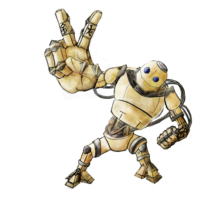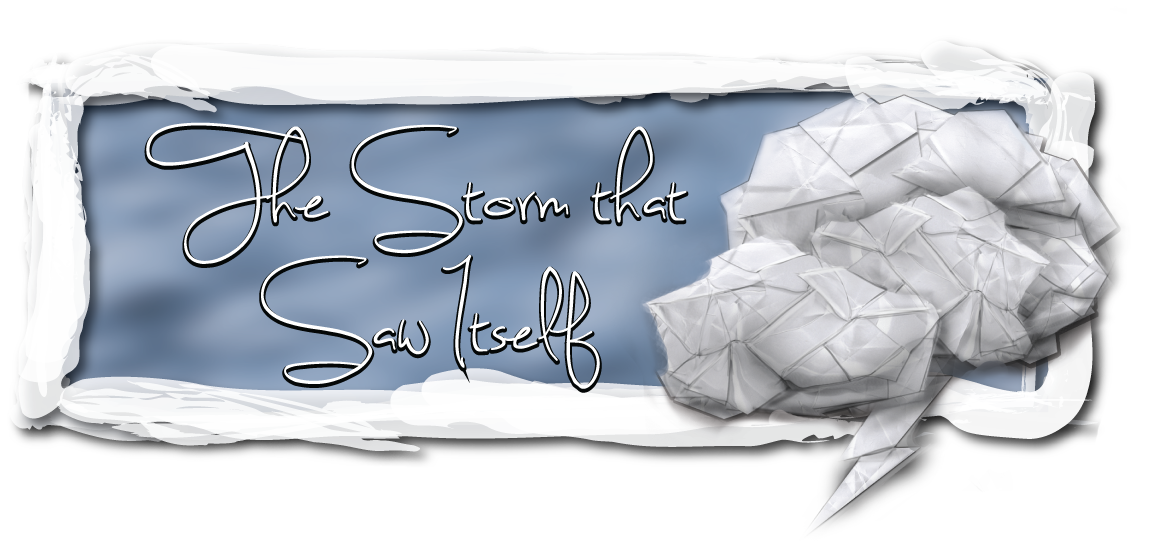– 1 –

One summer, when Emily’s eyes have gone all-over gold and she has been given over to the Keepers’ House, she sits on the hillside with Eldri and his amazing rock-paper-scissors-playing robot Navvy Jim, and Eldri tells her stories of the beginning of the world.
He tells her the story of Hans.
“A long time ago,” Eldri says, “when the world was chaos, and you could hardly stir a pot without a fiend arising from the turmoil or a horror clawing down to eat your face, there was a svart-elf named Hans, and his eyes were purest gold.”
“Really? Like mine?”
“Like yours,” Eldri says. “Oh, that wasn’t totally unusual or anything. Any svart can —”
Here he ponders. He closes his eyes. He opens them. He stares at Emily and there is a ring of gold around his pupils, and then his eyes drink her in, they loom large around her, they hold her as if she floated between the Earth and the Moon.
She giggles at this. She twists in her mind and writhes away and slips down to the ground, as if to land from flight on the wet grass of the night; shakes off the vision, and is staring at her godfather (whom she calls uncle, incorrectly) across the room again.
“— but it’s rare for it to be so complete, so unrelenting, so always-on. His mother knew he was something special, and his father drank a lot and rode around on underground dragons.”
“That’s poor parenting,” Emily criticizes.
“It was a chaotic time,” Eldri concedes. “In fairness, his mother only really managed three or four years with Hans herself before she flew away on a gigantic red bat.”
“Wow,” Emily says.
She flits up to her feet. She hugs Navvy Jim, who looks at her in perplexity. Then she sits down again.
“He was a svart-elf, of course,” Eldri says, “So he could manage pretty well on his own, particularly with three or four full years of a mother’s love. He went around doing this and that and finally realized, ‘you know, this world’s a pretty crazy place. It’s just this sea of impressions that’s constantly giving rise to abominations. But wouldn’t it be better if things had reasons? If questions had answers? If you could look this way and that and everywhere there’d be a reason why?’”
“That’s silly,” says Emily.
“Is it?”
“Well,” Emily says, “if things didn’t have answers, how could he bother asking questions?”
“That’s a good point,” Eldri says, “I suppose. I certainly don’t think anything did answer him, when he asked those questions. So there’s that! . . . But there might have been a cave cucumber or something that he talked to. I don’t know. The stories are kind of ambiguous when they’re talking about stuff that’s all the way back then. Maybe his Mum flew by on her bat, or his Dad had hiccupped out a boozelemental or something caparisoned in shell and trident that answered him when he asked; but if anything like that had happened, nobody’s ever said to me.”
“Mm,” Emily says.
“So he built the world,” Eldri says. “He tamed it. He stomped it flat, as it were, although I guess that technically he stomped it round.”
“That was good work!” Emily says.
“And there were still monsters,” Eldri says. “Horrors. Awful world-devouring things. They hung out around the edges of his construction. They were what was left over of the wild, you see. Gorgons, you know, and the nithrid, and drownéd Pepsi, and the like. You could even say — they were awful things, they were world-ending things, they were monsters, because they were what was left over of the wild that came before. Because if they were the kinds of things what fit into the world Hans made, then they would have done; but instead, they didn’t. So he locked them up, bound them, trapped them, killed them sometimes — though that was bad,” he asides.
“You can’t?” Emily says.
Navvy Jim looks over. He says, softly, “It makes the world much less.”
“Mm,” Emily says. “But what if it were a hundred-handed monster that was always throwing rock, paper, and scissors?”
Navvy Jim’s eyes light with soft amusement. “Or a young girl throwing ‘whale?’”
Emily, who used to shake up the rules of rock-paper-scissors in just that exciting fashion, tightens her lips. That’s a burn, she admits.
“Hans took,” Eldri says, “everything that didn’t fit, and he caged it in the earth, or wrapped it around the stars, or wove it through the sky, or even tied it through itself. He set toads to glower at it, or turned it into gold; cut off a foot sometimes, taught stupid mind-devouring riddles to it, whatever. All day, all night, he was down there in the depths of the Earth, trying to pin down the chaos and make it bland. And he kept waiting for it to get easier, you know, particularly once you really had a world to live in, once you had your continents and your seas and even some kind of order to the underworld beneath; he kept waiting for stuff to settle down and for everything to just be good, but it didn’t, it never did. He kept working on that until the very end; until the scissors fell.”
Emily thinks about that.
“In the Keepers’ House,” she says, “we say — I mean, in our inside voices, but still — that Gotterdammerung will come.”
“Yes.”
“That we can hold it at bay,” Emily says. “That we can stand in creepy circles around people and push it back. But it’ll still come. It’s too late for anything else. The world’ll burst.”
“Well,” Eldri says, “Hans died.”
“The world can’t burst,” says Navvy Jim.
“No?”
“I won’t allow it.”
“That’s a brave robot,” says Eldri.
“You can’t stand in creepy circles around people,” Emily says. “You’re a rock-paper-scissors-playing robot.”
“I will have to stop the bursting of the world by playing rock-paper-scissors,” Navvy Jim agrees.


